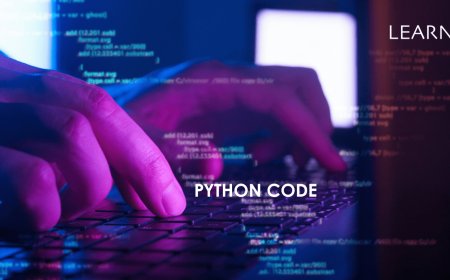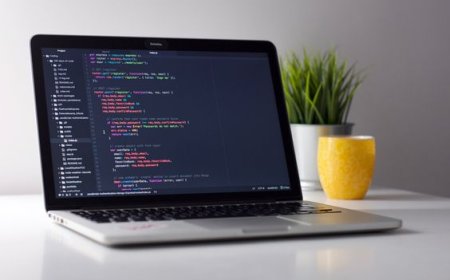python programming skills
Improve your career by learning important Python programming skills. Get a good grasp of Python quickly and understand the basics of the language well.

Python is a popular programming language known for its simplicity and versatility. It's widely used in various fields like data science, machine learning, and web development. This guide will help you understand Python programming, covering essential concepts and practical applications. Python skills are essential for modern development. Whether you're new to programming or an experienced developer, Python's easy-to-understand syntax makes it accessible. The Python community is vibrant, with many Python libraries and frameworks available for different purposes.
Python is used in data science to analyze large datasets and in machine learning to create AI solutions. It's also great for web development, with frameworks like Django and Flask for building dynamic websites. Python provides numerous libraries and tools for different tasks. From Pandas for data manipulation to NumPy for scientific computing, Python has something for everyone. This guide will explore advanced Python concepts to help you innovate and solve complex problems. Let's embark on this journey together and discover the endless possibilities Python offers in shaping the future of technology.
Exploring Advanced Python Concepts
Python is a really powerful and flexible programming language. It's known for being easy to learn, but if you want to take your skills to the next level, you'll need to understand some more advanced stuff. Let's take a closer look at three important topics: Object-oriented programming (OOP), Handling Errors, and Working with Files.
1. ObjectOriented Programming (OOP)
Object-oriented programming (OOP) is a way of organizing your code. Here's what you need to know:
-
Classes and Objects: Classes are like blueprints for creating objects. They contain data and methods (functions) that work with that data. Objects are instances of classes.
-
Inheritance: This lets one class inherit attributes and methods from another. It's handy for reusing code and building relationships between classes.
-
Polymorphism: This allows different objects to be treated the same way. It adds flexibility to your code.
-
Encapsulation: Encapsulation means bundling data and methods together. It keeps things organized and hides the inner workings of your objects.
2. Handling Errors
Sometimes things need to be corrected in your code. Python helps you deal with that:
-
TryExcept Blocks: You can put code that might cause errors inside a try block. If something goes wrong, you can handle the error in the except block.
-
Handling Specific Errors: You can catch specific types of errors and deal with them differently. This helps you respond appropriately to different problems.
-
Finally Block: This is a block of code that always runs, whether there's an error or not. It's useful for cleaning up resources, like closing files.
3. Working with Files
Reading from and writing to files is a common task. Python makes it easy:
-
Reading from Files: You can use methods like read(), readline(), or readlines() to get data from files. Just be sure to handle errors if the file isn't where you expect it to be.
-
Writing to Files: Python offers different modes for opening files, depending on what you want to do. And remember to close files properly when you're done writing to them.
-
File Pointers: These help you keep track of where you are in a file. You can use them to read specific parts of a file or to add new data in the right place.
Python Application Development
Python is awesome for making all kinds of apps. It's simple and can do a lot, from making pretty interfaces to grabbing info from the internet and even automating tasks.
-
Making Pretty Interfaces: Apps need to look good, right? Python has tools like Tkinter and PyQt for this. Tkinter is simple and great for basic stuff. If you want something fancier, PyQt is there for you. Whether you're building a tool for work or a cool app with graphs and charts, Python makes it easy to bring your ideas to life.
-
Getting Info from the Web: In today's world, info is crucial. Python helps you grab data from websites fast. Libraries like BeautifulSoup and Scrapy make it easy. You can use this for anything, like checking out your competition, getting market insights, or just gathering info for research. Python makes it simple to grab the data you need and use it for smart decisions.
-
Automating Boring Tasks: Nobody likes doing the same thing over and over. Python helps you automate tasks so you can focus on more important stuff. Need to organize files, process data, or handle system stuff? Python's got your back. You can even use it to automate web tasks, like filling out forms or testing websites. Python makes it easy to save time and reduce mistakes.
Best Practices and Optimization in Python Programming Skills
In the coding world, making your code efficient, reliable, and easy to work with is important. Whether you're new to coding or a seasoned pro, there are some easy ways to improve your code quality and productivity in Python. In this blog post, we'll go through some important things to keep in mind when writing Python code, focusing on making it fast and using less memory, good documentation, testing, and following some guidelines.
Code Optimization:
Writing good Python code means making it both fast and not using too much memory. Here are some easy tips:
1. Choose the Right Algorithm: Pick the best way to solve your problem. Think about things like how much data you have and how much computer power you need.
2. Use Good Data Structures: Think about what kind of data you're working with and use the best way to store it. There are different types of data structures like lists, sets, dictionaries, and tuples. Each one is good for different things.
3. Smart Ways to Loop Through Data: Use shortcuts like list comprehensions and built-in functions like `map()` and `filter()` to go through data faster and with less code.
4. Don't Do the Same Thing Over and Over: If you're doing the same calculation or repeating a task, save the result so you don't have to do it again. This makes your code faster.
5. Use Special Libraries: There are special libraries like NumPy and Pandas that make common tasks faster and easier.
Documentation and Testing:
Writing good code isn't just about making it fast; it's also about making it easy for others (and yourself) to understand. Here's how:
1. Explain Your Code: Use good names for your variables and write comments to explain what your code does.
2. Test Your Code: Make sure your code works by testing it. Look for problems and fix them before they become big issues.
3. Test Automatically: Use tools that test your code automatically. This helps catch mistakes early and makes sure your code stays good.
PEP Guidelines
There are some guidelines for writing Python code. These guidelines help make your code look nice and work well with other people's code. Here are a few:
1. Make Your Code Look Good: Follow the PEP 8 guide for things like how your code looks and is organized.
2. Write Good Descriptions: Use PEP 257 to write good explanations about what your code does.
3. Follow Python's Ideas: The Zen of Python (PEP 20) gives some ideas about how to write good Python code. Following these ideas helps make your code better.
Specialized Applications Beyond Basic Programming
Python is a powerful programming language that goes beyond basic tasks. It's not just for web development and automating stuff; it's a star player in fields like data science, making games, and scientific calculations. Let's see how Python rocks in these areas:
1. Data Science and Machine Learning
Python is awesome for digging into data and teaching computers to learn. It has tools like scikitlearn, TensorFlow, and PyTorch that make crunching data and building smart systems a breeze. Whether you're analyzing big piles of numbers or training complex brain-like networks, Python is flexible and fast.
2. Game Development
Believe it or not, Python is great for making games too! With tools like Pygame, you can whip up 2D games pretty easily. And if you want to dive into 3D, Python plays well with big game-making kits like Unity. Its simple rules and big fanbase help game makers bring their cool ideas to life.
3. Scientific Computing
Tools like SciPy help scientists solve tough problems, from math puzzles to signal secrets. Python's easy-to-read code and helpful add-ons let researchers focus on discoveries, not wrestling with their computers.
Community Resources and Collaboration
In coding, connecting with others and working together is important, especially in Python. Let's take a quick look at how you can make the most of online groups, version control systems, and open-source projects to boost your Python skills and be part of an awesome developer community.
1. Online Hangouts:
-
Stack Overflow: It's like a big library of solutions. Join in on the Python discussions, ask questions, and share your answers to help others.
-
Reddit's r/Python: This is a lively place where Python enthusiasts chat about news, and projects, and share useful stuff. Jump into conversations, get advice, and show off your projects for feedback.
-
Python Discord Servers: These are like real-time chatrooms for Python fans. You can ask for help, share cool things, and work on projects together. Joining these servers lets you connect with many people in the Python gang.
2. Version Control:
-
Git: Think of Git as a good tool for working together on code. Learn the basics, like saving changes and combining different parts of your code, to manage your projects smoothly.
-
GitHub: This is like a clubhouse for coders. It's where everyone hangs out to work on projects together. Get familiar with features like pull requests, issues, and code reviews to join in on the coding fun.
3. Open Source Teamwork:
-
Contribute to Projects: Help out on projects that are open to everyone. It's a great way to learn and give back to the community. Start with easier projects and build up your skills over time.
-
Learn Together: Working on these projects shows you different ways of coding. Team up with experienced developers, get feedback on your work and learn from their experience to keep getting better at coding.
In summary, getting good at Python programming skills can open up a ton of doors in the tech world and beyond. Whether you're just starting out or already know a bit, Python is flexible and useful for all sorts of cool stuff. You can make websites work with data, do fancy math stuff, or even build your programs. Plus, lots of people use Python, so there's a big community to help out if you get stuck. By spending time in Python tutorials, you can set yourself up for success and grab onto all sorts of opportunities in today's tech world.




































